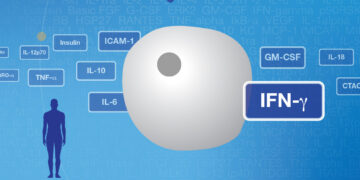
Saving Lives: Innovative Therapeutic Applications of Ion Exchange Resins
Although chromatography resins are usually thought of as tools to purify medicines, groundbreaking treatments now utilize resin beads as an integral component of the therapy itself. These therapies are essential for treating certain cancers and inflammatory disorders.

Global Lung Cancer Expert Dr. Ed Schuuring on How ddPCR Technology Powers ctDNA Analysis
Characterizing biomarkers in lung cancer tumors is challenging due to the high risks associated with tissue retrieval. Liquid biopsy offers a safer alternative but requires highly sensitive and precise methods to generate robust results from minimal genetic material. In this video, Dr. Schuuring of the University Medical Center Groningen discusses how Droplet Digital PCR (ddPCR) is used in his laboratories and why this technology has become critical for his research.

Advancing Oncology Research with Immune Response Studies: The Role of xMAP-Based Bio-Plex Multiplex Immunoassays
In the rapidly evolving field of cancer research, understanding the complex interplay between tumors and the immune system is essential for developing effective therapies. Bio-Plex Multiplex Immunoassays, for research use only and powered by Luminex xMAP technology, provide a cutting-edge tool for simultaneously measuring multiple immune biomarkers. Learn how these research tools are paving the way for development of personalized cancer treatments in the future.

Insights from Droplet Digital PCR World 2024
In June, Bio-Rad hosted Droplet Digital PCR (ddPCR) World 2024, the premier digital PCR event bringing together global leaders in science and innovation. ddPCR World features experts showcasing how ddPCR technology has been instrumental in overcoming some of their most complex research and manufacturing challenges. In this article, we are excited to share key insights and cutting-edge research using ddPCR technology that are driving scientific breakthroughs across the globe.

More to Learn from ESR1 Using ctDNA Analysis
Estrogen receptor 1 (ESR1) mutations in breast tumors were first identified nearly 30 years ago. Since then, technology has evolved, as has our understanding of the impact these mutations have on tumor cell physiology. Given the dynamic nature of ESR1 mutation acquisition and enrichment, ctDNA samples appear to be the most robust source for analysis. Droplet Digital PCR (ddPCR) enables rapid, highly sensitive, cost-effective analysis of ctDNA, providing a powerful tool for this critical area of cancer research.

CAR T-Cell Therapy and the Cytokine Storm: The Balancing Act at the Center of Next-Generation Cancer Therapies
Recent advances in chimeric antigen receptor (CAR) T-cell therapy have opened exciting new avenues for the treatment of a variety of malignancies. Cytokine release syndrome (CRS), a powerful immune response to activated CAR T cells, is the primary side effect of CAR T-cell therapy, but existing CRS treatments can make CAR T-cell treatment less effective. In two recent studies, researchers used multiplexed cytokine immunoassays to better understand how CAR T-cell therapy triggers CRS and to identify strategies for early intervention in CRS development.

Developing Biotherapeutics for Lung Cancer Treatment
In recent years, biologics — drugs derived from living culture systems — have become increasingly significant in the fight against a plethora of conditions. Unfortunately, the efficiency of these drugs comes at a cost. A daily dose of a biologic drug costs, on average, 22 times more than conventional small-molecule drugs. Therefore, biosimilars are developed to make them more accessible. Lung cancer is an example where the development of biosimilars could increase treatment options available for patients.

Enhancing the Power of Microsatellite Instability Detection with ddPCR Technology
As the third most prevalent cancer worldwide, colorectal cancer (CRC) is a significant global health burden. Biomarker identification and detection has proven a powerful strategy for improving CRC diagnosis and informing targeted treatment. Microsatellite instability (MSI) is a key biomarker in CRC, and with Droplet Digital PCR (ddPCR), MSI can be accurately detected using a wider range of sample types.

Efficacy of a Novel Treatment for Multiple Myeloma Established by Flow Cytometry
Autologous stem cell transplantation (ASCT) is an effective treatment strategy for multiple myeloma (MM) but isolating enough hematopoietic stem and progenitor cells (HSPCs) for transplantation can be challenging. The selective CXCR4 inhibitor motixafortide has been shown to be a safe and efficacious HSPC mobilization agent in a phase 2 trial when paired with G-CSF. Crees et al. (2023) report the results of the phase 3 trial, in which they used the ZE5 Cell Analyzer to explore motixafortide’s mobilizing effects.

Deciphering Cancer Cell Heterogeneity for Precision Medicine
scATAC-seq is a powerful tool for studying cancer cell heterogeneity. Watch this webinar to see how scATAC-seq can deliver greater insights to your research.
